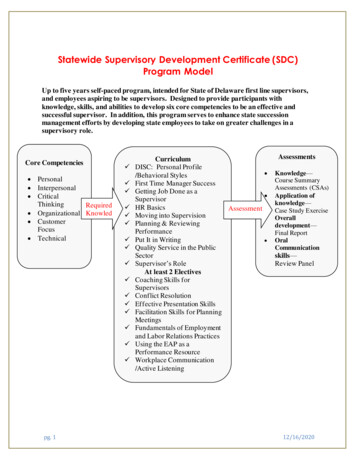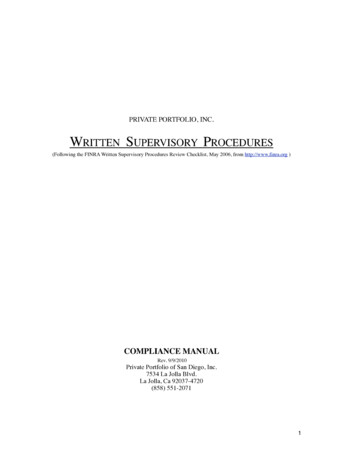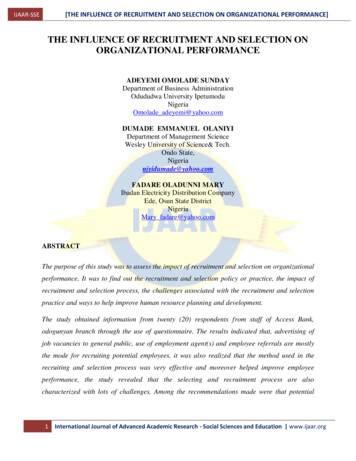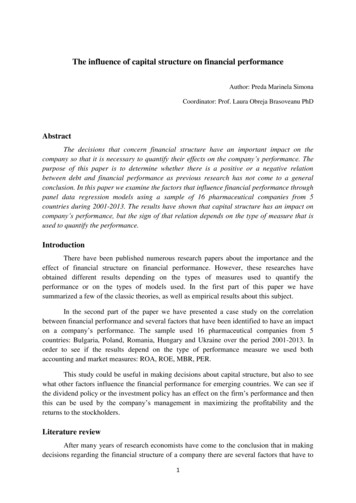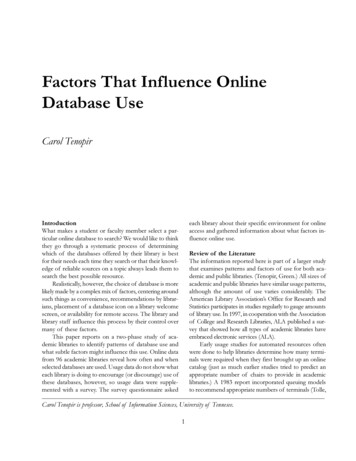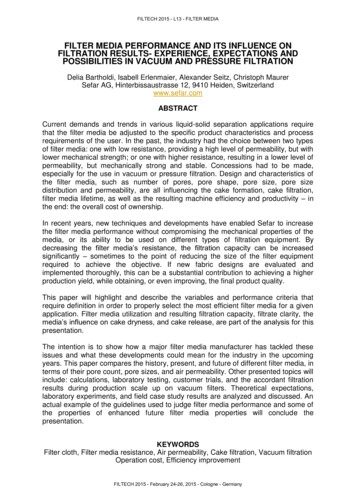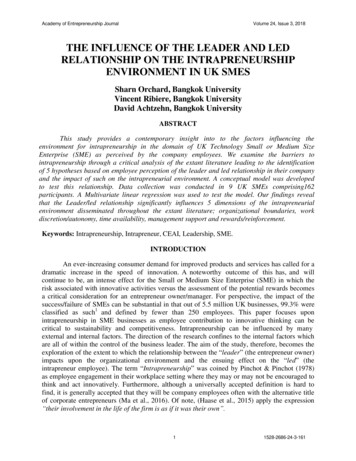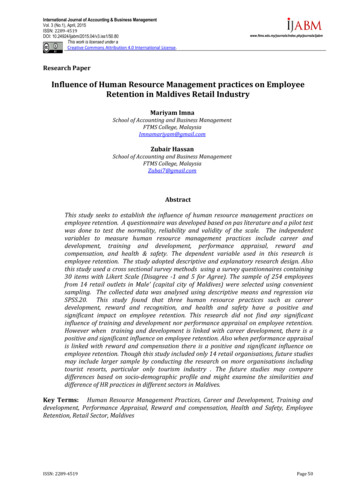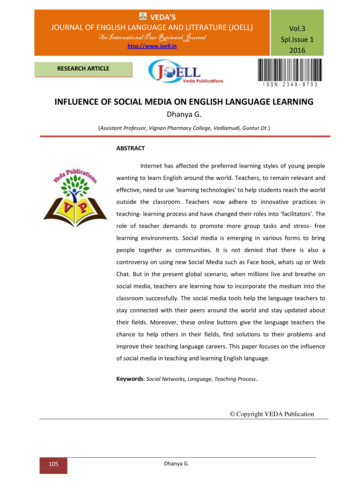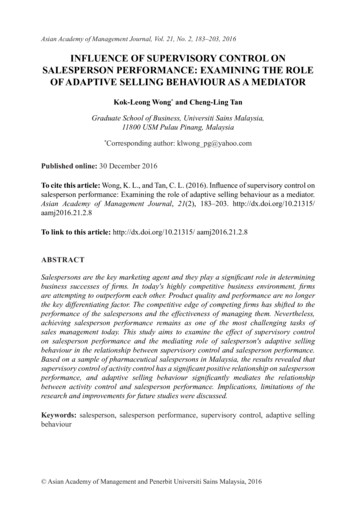
Transcription
Asian Academy of Management Journal, Vol. 21, No. 2, 183–203, 2016INFLUENCE OF SUPERVISORY CONTROL ONSALESPERSON PERFORMANCE: EXAMINING THE ROLEOF ADAPTIVE SELLING BEHAVIOUR AS A MEDIATORKok-Leong Wong* and Cheng-Ling TanGraduate School of Business, Universiti Sains Malaysia,11800 USM Pulau Pinang, MalaysiaCorresponding author: klwong pg@yahoo.com*Published online: 30 December 2016To cite this article: Wong, K. L., and Tan, C. L. (2016). Influence of supervisory control onsalesperson performance: Examining the role of adaptive selling behaviour as a mediator.Asian Academy of Management Journal, 21(2), 183–203. http://dx.doi.org/10.21315/aamj2016.21.2.8To link to this article: http://dx.doi.org/10.21315/ aamj2016.21.2.8ABSTRACTSalespersons are the key marketing agent and they play a significant role in determiningbusiness successes of firms. In today's highly competitive business environment, firmsare attempting to outperform each other. Product quality and performance are no longerthe key differentiating factor. The competitive edge of competing firms has shifted to theperformance of the salespersons and the effectiveness of managing them. Nevertheless,achieving salesperson performance remains as one of the most challenging tasks ofsales management today. This study aims to examine the effect of supervisory controlon salesperson performance and the mediating role of salesperson's adaptive sellingbehaviour in the relationship between supervisory control and salesperson performance.Based on a sample of pharmaceutical salespersons in Malaysia, the results revealed thatsupervisory control of activity control has a significant positive relationship on salespersonperformance, and adaptive selling behaviour significantly mediates the relationshipbetween activity control and salesperson performance. Implications, limitations of theresearch and improvements for future studies were discussed.Keywords: salesperson, salesperson performance, supervisory control, adaptive sellingbehaviour Asian Academy of Management and Penerbit Universiti Sains Malaysia, 2016
Kok-Leong Wong and Cheng-Ling TanINTRODUCTIONBusinesses are getting more dynamic and competitive, as there are a wide varietyof choices of products and services being offered by firms. Due to the intensecompetition in the market, there is a threat that products and services may declineinto a commodity business in which products and services are getting harder tobe differentiated. Consequently, in order to gain a competitive edge, firms have toshift their competitive differentiation to the uniqueness of their human capital andthe effectiveness of managing their human capital.It has been a long history that firms have been using salespersons as the marketingagent of businesses. Salespersons are key in the promotion of products and services,as well as building relationships with customers. It has been reckoned that thesingle most effective way to promote products and services to the prospectivecustomers is the use of salespersons (Zoltners, Sinha, & Lorimer, 2008, 2009).Being at the forefront of any firms, salespersons play several important roles. Firstand foremost, salespersons are the financial contributors of the firms as they areentrusted to bring in revenue and profit for firms' long-term sustainability. They arealso responsible to foster and grow the business relationships with the customers(Zoltners et al., 2009). Second, salespersons are seen as the change agent ofbusinesses as they use their salesmanship skills to trigger the buying decision inthe selling process. While other marketing efforts aim to create the 'pull' effects,salespersons are responsible to 'push' the products to the target customers (Zoltnerset al., 2008). Third, salespersons are the boundary spanner of the selling and buyingfirms by matching the supply and demand of both parties (Stan, Evans, Arnold, &McAmis, 2012). Last but not the least important, salespersons are an effectivecommunication agent who convey up-to-date information between their firms andthe customers (Ingram, LaForge, Avila, Schwepker, & Williams, 2012).Knowing the important roles played by the salespersons, businesses are spendingto invest in hiring and maintaining salespersons. Unless the salespersons can trulyperform, otherwise maintaining and managing salespersons becomes a cost burdento businesses. The budgets to maintain a sales force can be as high as 20% of thefirm's sales revenue (Zoltners et al., 2008). In revealing the truth, performanceof salesperson has been generally far from satisfactory. According to the globalsurveys conducted by Accenture (Accenture, 2010a, 2010b, 2012), Chief SalesOfficers of countries including Malaysia, who participated in the global surveys,revealed that typically only the top 20% of the salespersons bring in more than60% of the firm's revenue. The surveys implied that the remaining 80% of thesalespersons are considered ineffective and can be a cost burden to the firms(Accenture, 2010a, 2010b, 2012).184
Influence of Supervisory Control on Salesperson PerformancePast research examining salesperson performance has been largely focused onfactors related to individual salesperson's personal characteristics and attributes(Verbeke, Dietz, & Verwaal, 2011). Even though supervisory control has beenextensively researched, the findings are still inconclusive (Fang, Evans, & Zou,2005; Flaherty, Arnold, & Hunt, 2007). Besides, past studies examining thesalesperson's adaptive selling behavior (ASB) and salesperson performancehave also reported inconsistent or mixed results, while a majority of the studiesreported results supporting the positive relationship between the salesperson'sASB and salesperson performance (Kidwell, McFarland, & Avila, 2007; Spiro& Weitz, 1990). Due to the observed inconsistencies and mixed results reportedin the relationship between the supervisory control and salesperson performance,as well as the relationship between salesperson's adaptive selling behaviour andsalesperson performance, this study propose to introduce salesperson's adaptiveselling behaviour as a mediator with the aim of filling the gaps on the abovementioned.In view of this performance issue, the study of salesperson performance hasbecome more important today than it has been in the past, as what influence theperformance of salesperson needs to be clearly understood. However, the numberof past studies examining factors that influence the performance of salesperson inMalaysia has been very limited. Therefore, the purpose of this study is to contributeto the extant literature by examining the following two questions:1. To what extent does supervisory control influence salesperson performance?2. To what extent does salesperson's ASB mediate the relationship betweensupervisory control and salesperson performance?LITERATURE REVIEWSalesperson PerformanceSalesperson performance refers to the financial and non-financial accomplishmentsachieved by the individual salesperson with respect to the roles and responsibilitiesset forth by the firm. It indicates how well the individual salesperson performshis or her sales related tasks when carrying out the assigned job responsibilities(Babakus, Cravens, Grant, Ingram, & LaForge, 1996).As salespersons largely contribute to firm's revenue, performance of thesalespersons greatly affects the overall performance of the firm. Due to theimportant contribution of salespersons to firm's business and profitability, research185
Kok-Leong Wong and Cheng-Ling Taninto what drive salesperson performance has attracted attention from scholars andsales researchers (Zoltners et al., 2008, 2009).Past research in examining salesperson performance has been primarily onfactors related to individual or personal characteristics as salespersons are oftenthe ones blamed for firm's lackluster sales performance (Verbeke et al., 2011).However, examining direct influence of factors related to individual or personalcharacteristics on salesperson performance has not been able to explain a largevariance in salesperson performance. Subsequently, scholars proposed thatstudies related to salesperson performance should be examined by exploringmanagement practices (Avlonitis & Panagopoulos, 2007) as the determinant ofmanagerial practices is one of the controllable organizational factors which caninfluence salesperson's motivation, attitude, behavior, commitment, satisfactionand performance (Churchill, Ford, Walker, Johnston, & Tanner, 2000).Hence, scholars proposed that the focus should be shifted to managerial factorsbecause sales management is known to play an influencing role in a salesperson'sbehaviors and attitudes (Cravens, Le Meunier-FitzHugh, & Piercy, 2011). Basedon a literature search using the available online databases on managerial practices,a large proportion of past research examining salesperson performance was relatedto supervisory control (Guenzi, Baldauf, & Panagopoulos, 2014). However,the mechanism of how supervisory control influences salesperson performanceremains a black box. Scholars believed that managerial practices of supervisorycontrol influence salesperson's own behaviors, which in turn, lead to salespersonperformance (Evans, McFarland, Dietz, & Jaramillo, 2012).Supervisory ControlSupervisory control is the mechanism used by the sales management of the firmto manage and control their sales resources efficiently (Anderson & Oliver, 1987;Piercy, Cravens, & Lane, 2012). Supervisory control can be seen as a process bywhich the firm regulates or adjusts the behavior of its salespersons in the directionof meeting the firm's business objectives (Challagalla & Shervani, 1997).Based on the original conceptualization of Jaworski (1988) which was refined byChallagalla and Shervani (1996), supervisory control consists of 3 dimensions:(a) output control, (b) activity control and (c) capability control. Output controlaims to drive salespersons to achieve end-results. Activity control focuses onhow salespersons execute and accomplish their selling-related tasks. Capabilitycontrol intends to enhance the quality of selling by improving salesperson'sskills and abilities. Both activity control and capability are often being referred186
Influence of Supervisory Control on Salesperson Performanceto as behavior control as they aim to influence the behavioral performance ofsalespersons (Challagalla & Shervani, 1996). Behavior control involves relativelyclose supervision from the sales management in specifying the tasks, activities,abilities and skills, that are expected to be achieved or completed (Miao, 2007). Incontrast to behavior control, in output control, salespersons are given the freedomto achieve the sales outcomes and salesperson performance is directly measuredbased on their sales revenue achievements (Challagalla & Shervani, 1996).Salesperson's Adaptive Selling BehaviorSalesperson's selling behaviors have been described as the behavioral aspect ofthe salesperson in expending effort in the course of working and they are foundto have an influence on firm's sales effectiveness (Cravens, Ingram, LaForge, &Young, 1993; Wren & Simpson, 1996) and salespersons' performance (Boles,Brashear, Bellenger, & Barksdale, 2000). Among all these selling behaviorsexamined, the salesperson's adaptiveness in selling encounters has been identifiedas the most significant contributor to sales effectiveness (Wren & Simpson, 1996).The concept of applying adaptiveness in selling behaviors is known as AdaptiveSelling Behavior (ASB) (Weitz, Sujan, & Sujan, 1986).Salesperson's adaptive selling behaviour refers to the salesperson's behaviour inadapting, experimenting with different selling approaches from one customer toanother, varying selling styles from one situation to another, and being flexiblein selling approaches used. It also refers to the salesperson's altering of salesbehaviors during a customer interaction or across customer interactions based onthe perceived information about the nature of the selling situation (Weitz et al.,1986). Subsequently, salesperson's ASB has been widely studied by many scholars(Park & Holloway, 2003; Roman & Iacobucci, 2010; Spiro & Weitz 1990).RESEARCH FRAMEWORKBased on the literature review and the discussion in the preceding section, thefollowing research framework is developed to incorporate the influence ofsupervisory control and salesperson's ASB on salesperson performance.Supervisory Control Output Control Activity Control Capability ControlSalespersonPerformanceSalesperson's ASBFigure 1. The research framework187
Kok-Leong Wong and Cheng-Ling TanThe research framework is developed based on Social Exchange Theory (SET).In SET (Blau, 1964), there is a feeling of personal obligation within the employeeto reciprocate to the organisation (or management) and that develops a workplacecommitment and the behaviour to perform. When the employee feels that themanagerial practices are beneficial and useful, the employee is more likely toreciprocate by showing high levels of organizational commitment which leadsto positive work performance even to the extent of engaging in certain positivebehaviors that can benefit the organizations (Blau, 1964). Based on this underlyingtheory, the research framework intends to investigate if supervisory controlinfluences salesperson performance directly or through the mediating variable ofsalesperson's ASB.RESEARCH HYPOTHESESIn general, supervisory control, in the form of involvement and supervision by thesales management should provide guidance and motivation to the salespersonsto perform better (Baldauf, Cravens, & Piercy, 2001). Based on the underlyingSET, salespersons should react in a positive manner and reciprocate the influenceof supervisory control. In examining each individual dimensions of supervisorycontrol, there are sufficient empirical supports for a positive relationship betweenoutput control with salesperson performance (Guenzi et al.
achieved by the individual salesperson with respect to the roles and responsibilities set forth by the firm. It indicates how well the individual salesperson performs his or her sales related tasks when carrying out the assigned job responsibilities (Babakus, Cravens, Grant, Ingram, & LaForge, 1996).Cited by: 2Publish Year: 2016Author: Kok Leong Wong, Cheng Ling Tan
